Circular Economy in the Liverpool City Region
We have been collecting case studies of examples of local organisations involved in the circular economy – please click on the titles below to read the full stories…
Liverpool Tool Library is a circular organisation. Although the Library’s founder Imogen Wooley didn’t have a specific intention of establishing a circular organisation, she had the same reaction that many have when they first hear about the principles of the circular economy: ‘well yeah, obviously that’s the right thing to do’.
Without being explicitly aware of the principles of the circular economy Imogen Woolley, the Library’s founder created an exemplary circular organisation. One that applies the circular principles of renting and sharing to encourage sustainable consumption and resource efficacy.
Imogen had heard of the ‘libraries of things’ that were being established across the US, Europe and the UK’s South and went about establishing a library for the residence of Liverpool to benefit from: a library of DIY tools.
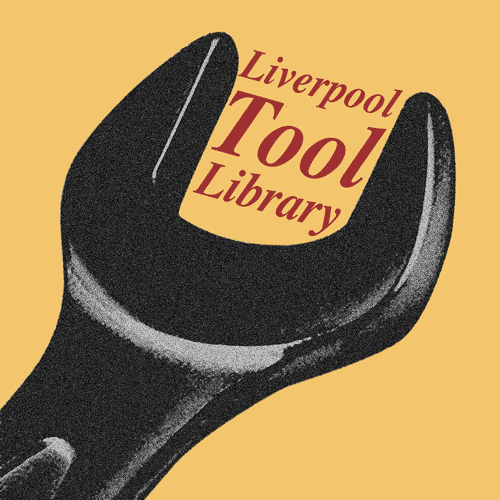
Initially being given 20 tools from the Edinburgh Tool Library, the younger Liverpudlian organisation has built upon its collection through donations and is not short of tools being donated by people willing to share their tools with the community. Saws, jigsaws, bike repair kits, extension cables, lawnmowers, hedge trimmers, ladders, trowels, all types of drills and cutting devices. You name it and the library can service DIY your needs!
Based in Aspen Yark off Lodge Lane, Liverpool Tool Library charges its patrons an annual subscription which allows you to borrow tools for a week at a time (longer rental periods can be arranged). The recommended yearly subscription is £20 however more or less is welcome (and advised) depending on one’s financial situation.
We hope to see more of these types of organisations being established across Liverpool City Region. Imogen is aware of this need and expressed an interest in expanding the model across the region. If this is something you are interested in supporting and growing we recommend giving Liverpool Tool Library a call and share in the lessons learnt, resources and best practice.
One of the founders of Farm Urban started out their career researching the field of Epigenetics, which looks at the ways in which different environmental factors such as the food we eat, directly impacts our genetic makeup. After completing his studies, Paul Myers spent some time in the United States witnessing how the government was spending billions of dollars on drugs to solve health problems that research showed could be prevented by a nutrient rich diet. From this experience, Paul realised that resolving issues in our food system could work to address the social, environmental and health issues we face in Western society.
Paul wanted to ‘optimise human health through food’ and started investigating the local food system in Liverpool to see how it could be changed for the better. Around this same time, Paul met Jen Thomas who was asking the same questions and shared Paul’s enthusiasm for permaculture, quantum mechanics and Thai-boxing. They began working together, combining their experience and knowledge to create Farm Urban with the vision of bringing about systemic change in the local food system.
Their idea turned to reality when they met the headteacher of Liverpool Life Science UTC in 2014 and were given the opportunity to teach students how to grow food in the urban environment. In 2017, the head teacher at Liverpool Life Science showed Farm Urban the underground tunnels that would go on to be their workshop, lab and office.
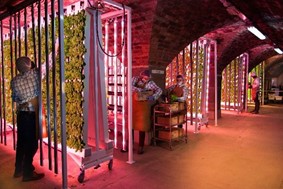
Now Farm Urban had a space to grow in and they began experimenting and conducting research into growing food in a space with no natural light. They soon received funding from Liv Housing’s Social Investment Fund, allowing them to purchase equipment that could create a self-sustaining business model: Greens for Good.
They deliver leafy greens across the region by bike, using special cardboard containers that keep the produce alive from farm to door, maximising nutritional value. Farm Urban also have their Routes and Shoots arm of the organisation which operates. alongside their customer delivery service. Routes and Shoots provide educational outreach service to schools teaching young people how to use aquaponic systems as well as working with organisations to install indoor vertical farms across the city.
In 2020 Farm Urban had planned to expand to start supplying local restaurants with green grown in the Baltic tunnels. However, due to COVID restrictions and restaurant closures, these plans were postponed. In typical circular fashion, Farm Urban built relationships with local third sector organisations and ensured nothing was wasted. In fact, the produce went to address food insecurity and food injustice at a pivotal time and enabled Farm Urban to develop relationships that enabled them to grow on the positive socio-economic impact they have in the region.
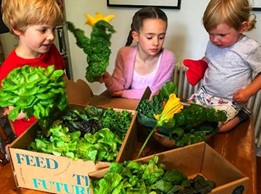
Farm Urban’s future ambitions are to integrate their urban food growing technologies into communities. This would work towards creating a thriving local circular economy that would have a three-fold regenerative impact: creating sustainable green jobs, providing locally produced zero-waste food, and gifting our communities with a shared space for wellbeing and learning.
FRC Group’s mission is to end furniture poverty across Liverpool City Region, and with 29% of residents across the region living in poverty this is no small feat.
The organisation is made up of three charities and social enterprises- Bulky Bobs, FRC Living and Buckingham Interiors- each of which is tackling this problem head on by providing furniture where needed across the region, with Bulky Bob’s focusing on reuse of items which are refurbished by their team.
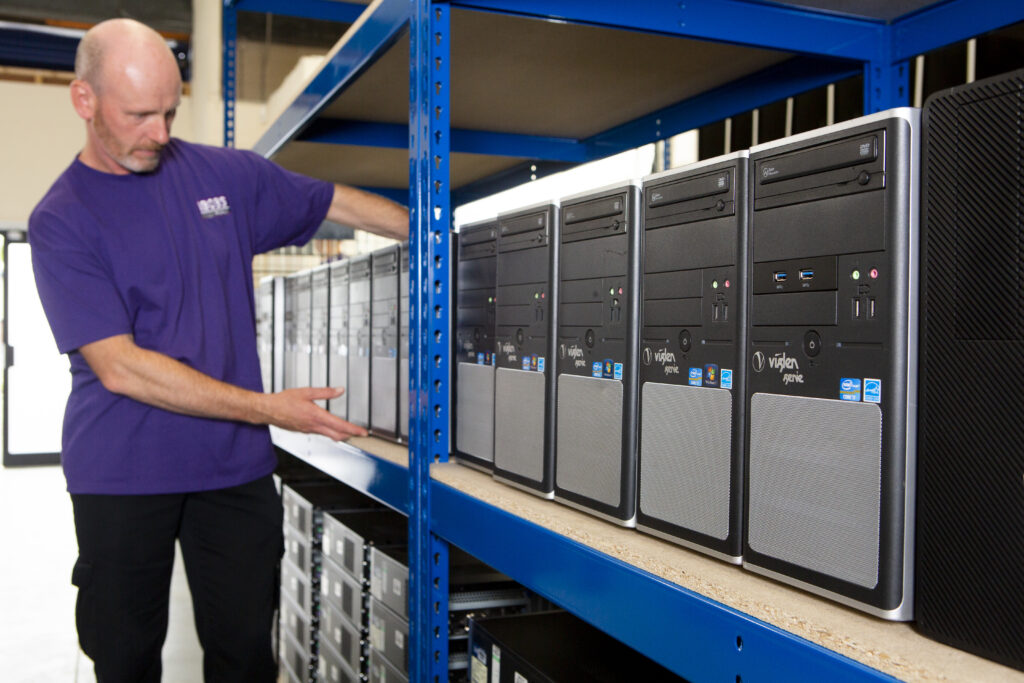
Working with Liverpool City Council and local housing associations, FRC Group redirects over 4000 tonnes of furniture from waste streams every year. These materials are collected from homes and businesses across Liverpool City Region before being redistributed through charities, housing associations, support services as well as being sold at a low price, at their London Road shop.
Furniture reuse is an effective way to employ a circular economy to materials such as furniture, textiles and household appliances and is especially effective in combating furniture poverty.
FRC Group applied the principles of the circular economy to a new material stream: IT equipment.
The demand for IT equipment has increased due to COVID-19 as people are spending more time at home and connection to friends, family, colleagues, teachers, and classmates via technology. When you consider this fact alongside that of the government cutting 80% of funding to schools for new IT equipment there has not been a better time for the redistribution and reuse of IT equipment.
The demand is there, but where is the supply? Many organisations, such as universities and businesses employ a life-cycle policy for their IT equipment in order to stay at the cutting edge of technological developments within their fields as well as having the resources to do so meaning that 90% of the products have not reached the end of their usable life before they are replaced.
After identifying this circular opportunity FRC group has begun to find ways to put these ‘waste’ materials to good use. Using their networks, a plan was hatched to redistribute the IT equipment that was still in good working order to schools across the region in need of IT equipment.
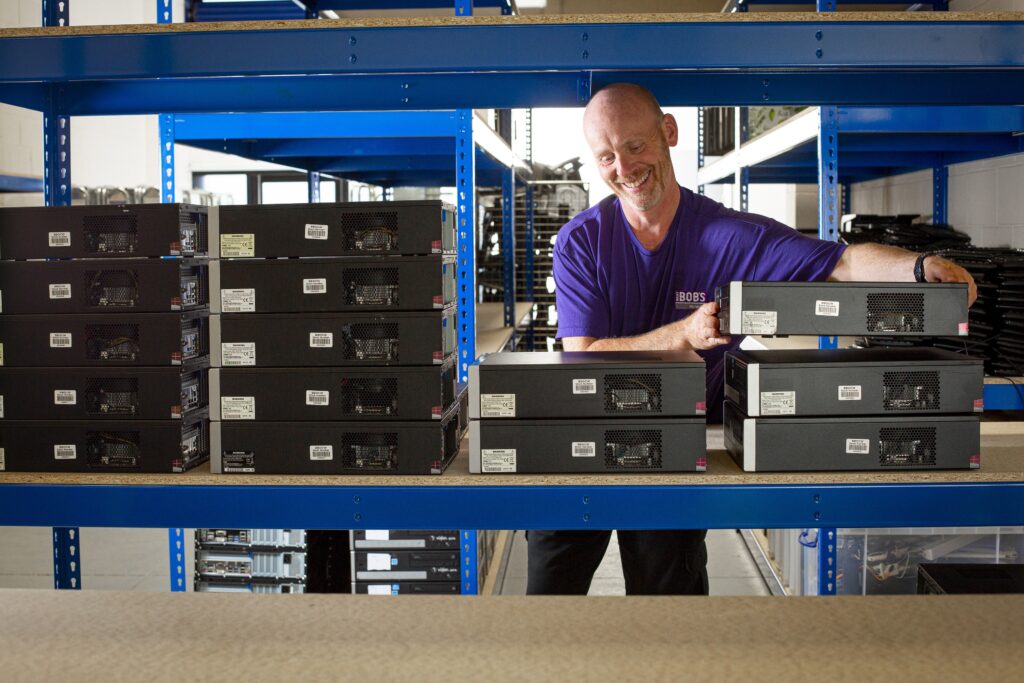
The IT equipment has its data wiped in Bulky Bob’s workshop before being made available to schools, charitable organisations and individuals (via Citizen’s Advice) across the region at a heavily discounted price, with 20% of them being given away for free to those most in need.
This project is still in its infancy but has the potential to expand and offer a range of businesses in Liverpool City Region the opportunity to put their ‘waste’ to good use by keeping it in the economy.
CEO of Bulky Bob’s, Shaun Doran commented:
“We have a waiting list of organisations who support children who need computers, but we have totally sold out of stock. We are sending out a plea to businesses who have 10 or more computers that they no longer use to contact us so we can ensure these make their way to those most in need in society, particularly children without IT access during the current lockdown.”
Kitty’s Laundrette was started by a group of local residents in response to a need for accessible neighbourhood community spaces and quality local services across North Liverpool and much of Liverpool City Region. Their vision is of high streets where communities can thrive socially and economically as well as places that support individuals to live within our planetary bounds.
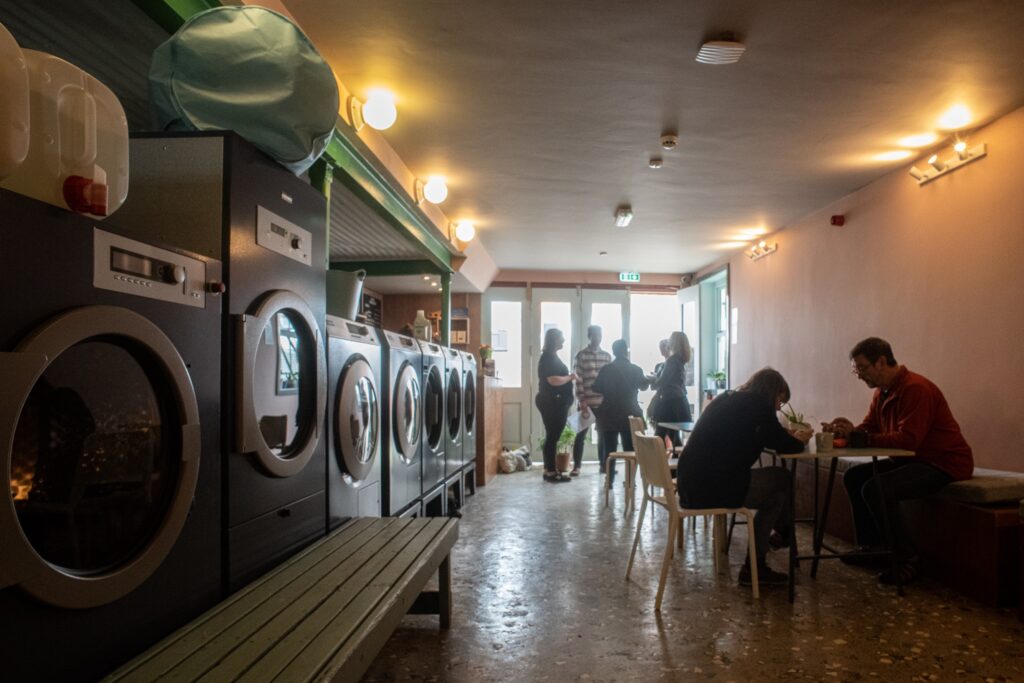
Inspired by Kitty Wilkinson the founder of the wash house movement in the 1800’s and who opened the UK’s first launderette on Upper Frederick Street in Liverpool. Kitty’s Laundrette today serves the community of Anfield by offering washing services, running events and being a welcoming space for people to drink a cuppa and read the paper whilst their clothes spin in a sustainable wash.
Kitty’s adheres to the social enterprise principles of the triple bottom line as demonstrated by its affordability, the welcoming community atmosphere and inclusionary events as well as its commitment to delivering an environmentally friendly service. Right at the start of the journey the decision was made to invest in energy efficient electric machines, use renewable energy providers and non-plastic consumables and for all washing products to be as environmentally friendly as possible. This commitment to sustainability and circular principles led the Launderette to start selling the eco-detergent through a re-fill system to customers, making the it the only place to buy eco-friendly washing products in the area. This fact demonstrates that the barrier to sustainability is not just affordability but accessibility.
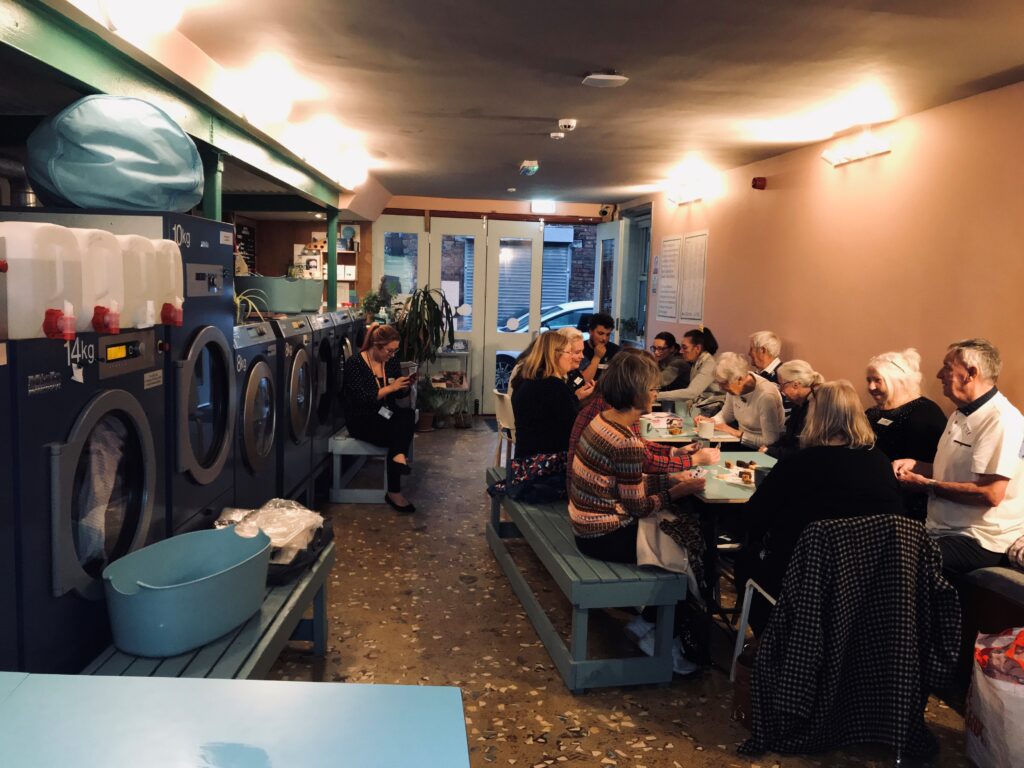
When I spoke to Grace Harrison, the Development Coordinator at Kitty’s she told me how some of the customers have the perception that environmentalism and the pursuit to be sustainable is not meant for them, something Kitty’s addresses by its very existence.
It is difficult to quantify the social value generated from Kitty’s as much of the value is interlaced within individual’s unique circumstances, however an independent social impact report done in Oct 2020 estimated that for every £1 spent £7 of social value is generated. This figure is certainly conservative when the positive environmental affects that this little Launderette on Grasmere Street L5 were not considered.
Whether its attracting businesses and individuals looking for a sustainable washing service or providing a vital service to an under resourced area by creating a space for the community, Kitty’s Launderette works to keep it local and sustainable and is a circular business in the renting of their low-energy machines and refill service offering. People need clean clothes, not a washing machine and harmful chemicals!
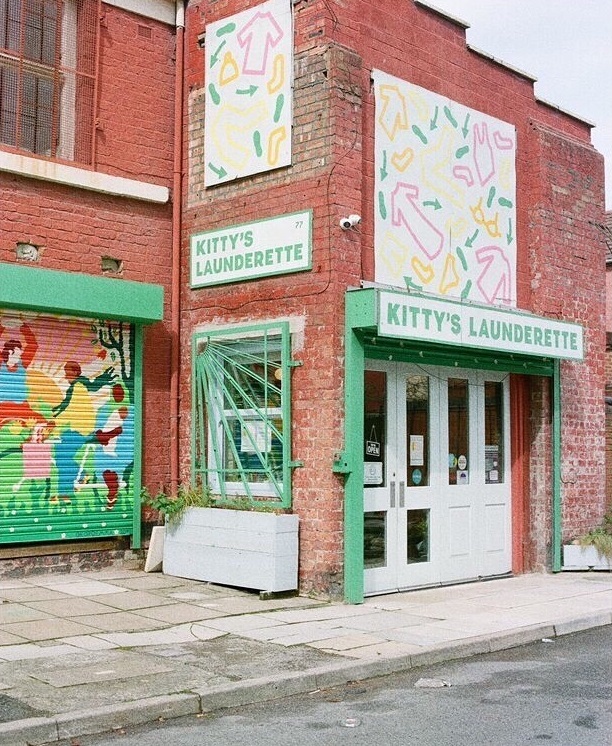
Create UK transports, processes, and recycles large domestic appliances across the Northwest. In keeping with their aim to move as many products as possible through the higher tiers of the waste hierarchy, they seek to reuse as many items as possible rather than sending them for recycling. This circular pursuit of keeping resources in the higher tiers of the waste hierarchy is essential to addressing climate emergency and can generate social value by providing employment opportunities in a range of skilled and semi-skilled roles.
Alongside the 16-permanent staff working within the Speke Warehouse, Create employ 4 members of staff on fixed term training contracts. These roles are continually kept open to allow young people entering the job market and people not currently in work the opportunity to learn transferable skills, gain valuable work experience and build confidence in the workplace.
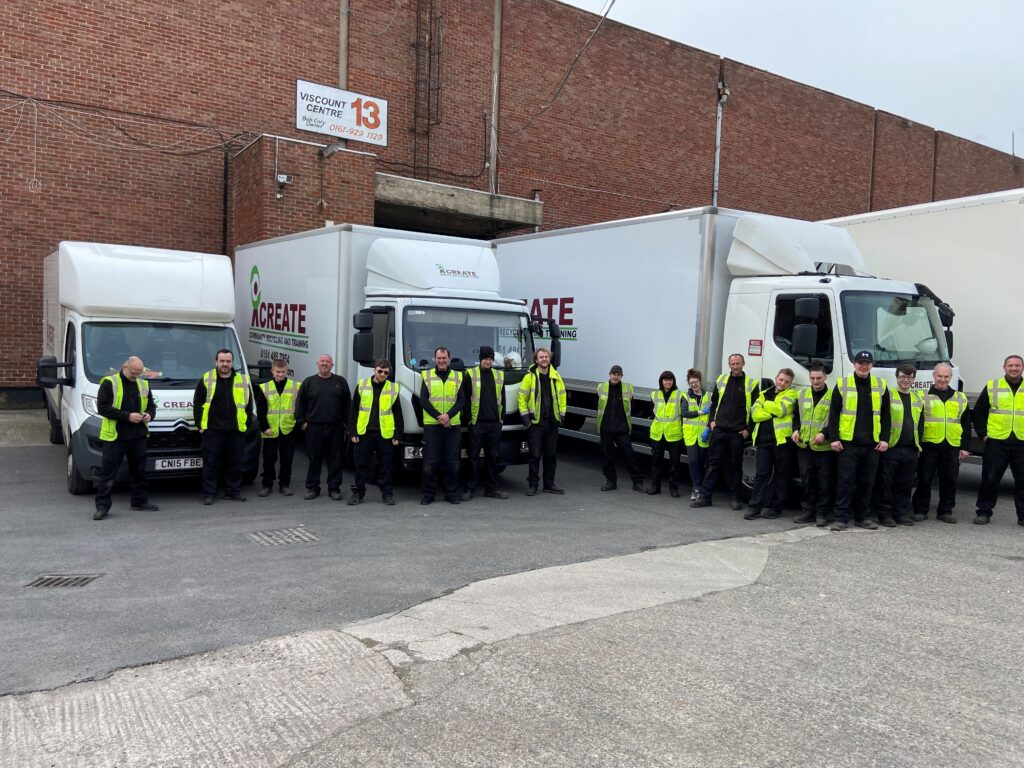
Operations Director Greg Walker is thrilled to support community wealth building within their circular organisation: ‘the employment and training side is the bit of Create that gives me the biggest buzz. Seeing people pass through our programs and gain full time employment either within the organisation or externally is exciting… plus, it builds our reputation as a fair and equitable employer’. Since its inception in the 1990’s CREATE has now trained and moved over 500 previously unemployed adults through into full time employment in the Merseyside area- so it’s easy to understand Greg’s fulfilment.
When asked how Create could expand their social value offering, Greg would welcome stronger links with other training organisations that currently support unemployed adults to get back into work. CREATE is keen to expand the training it provides in all sides of its business, with engineering, sales and transport operations providing real work experience alongside the training. Linking with agencies that can provide the additional personal support alongside that training would add greatly to the outcomes.
By supporting people to gain employment, organisations not only generate social value, but also allow for the growth of the business. By employing staff on fixed term training contracts, organisations such as CREATE can trial new processes and business strategies such as circular business models. If the new area of growth is successful, then the trainees can be welcomed into the team. Currently 14 of CREATE’s 16 permanent staff started as fixed term trainees.
